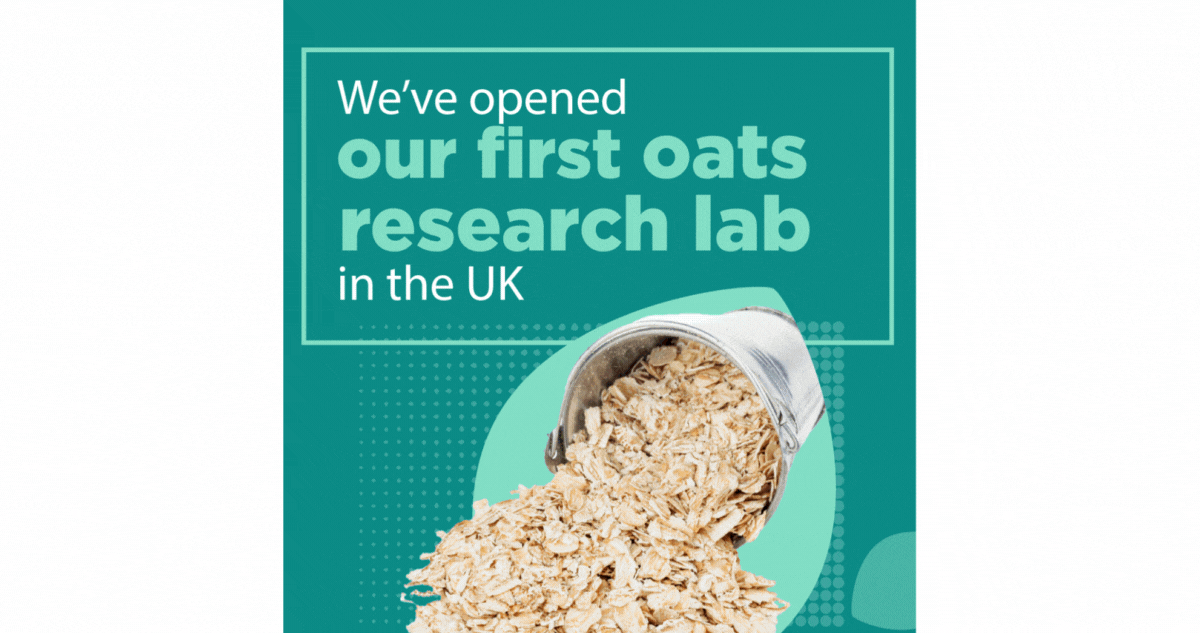In a UK first for PepsiCo, we've opened a new research lab dedicated to testing oats from our innovative R&D Agricultural Science programs in partnership with NIAB. The facility aims to help our 300+ UK Quaker Oats growers produce the best possible oats while reducing their greenhouse gas emissions and maximising yield, meeting future demand for Quaker products.
The new laboratory, located at crop research organisation NIAB in Cambridge, is home to state-of-the-art grain quality testing facilities. Expert crop researchers will now use the facilities to test and analyse thousands of oat samples from regenerative agricultural trials for milling and nutritional requirements.
This move follows our long-standing partnership with NIAB who work to improve agricultural and horticultural crop production, bringing together the specialist knowledge, skills and facilities required to understand the performance and quality of agricultural crop varieties and seeds.
The data collected from the lab will feed into our research projects including the Opti-Oat Crop Intelligence programme which offers information and insights on how to grow the perfect oat in our Oat Growth Guide, part of the Opti-Oat initiative which aims to deliver a 5-10% increase in yield while contributing to more sustainable crop production.
The facility’s opening builds on our trusted and close partnership with 300+ Quaker Oats growers. This includes helping all UK Quaker Oat farmers to reach the LEAF Marque sustainability standard by rolling out regenerative agriculture practices which support improved biodiversity, soil health, water and air quality.
Helping growers improve yield is more important than ever as Quaker Oats products continue to be firm favourites on breakfast tables across the country, with the vast majority of its range outside of the HFSS category following extensive reformulation and innovative new product development.
“Growers are facing pressure on several fronts, with issues like extreme weather and rising costs of materials like fertiliser, making it more difficult for them to grow their crops. With the new testing facility, we want to support growers by giving them useful data and insights that can help optimise their yield and produce the best quality Quaker Oats, while protecting the planet by reducing our greenhouse gas emissions.
With over 100,000 metric tonnes of oats going through our mill in Scotland every year, it's really important that we support our growers to meet growing consumer demand for Quaker Oats in a sustainable way. Our dedicated oat quality testing facility is a win for PepsiCo, NIAB, our growers and ultimately our consumers through producing the best quality Quaker Oats whilst delivering against our PepsiCo Positive goals. ”
PETER BRIGHT, SENIOR SCIENTIST, PEPSICO UK & IRELAND

Helen Appleyard, Head of Analytical Services at NIAB, added: “Setting up this facility with PepsiCo has been fantastic and we have benefitted from each other’s knowledge and experience in the industry. PepsiCo’s investment has improved our shared spaces and equipment, generated new ideas for ways of working and staff training opportunities, including better knowledge of the oat crop from field to bowl.”
The new facility comes as the popularity of Quaker Oats continues to rise, with the Quaker Pots range growing by +13% MAT 1 and Porridge To Go bars growing at +5.3% YTD TY2 . With health the no.1 need at breakfast3, the hot cereals segment, which includes Quaker Oats, has also grown by +1.4% RSV YTD YoY, and accelerated by +2% RSV YoY Latest 12 weeks4.
The move also forms part of PepsiCo Positive, our global strategy which puts health and sustainability at the core of our business. Globally, we're working towards our impact-driven Positive Agriculture ambition, aiming to achieve the following by 2030:
- Spread regenerative farming practices across 7 million acres (approximately equal to our entire agriculture footprint) which we estimates will eliminate at least 3 million tonnes of greenhouse gas emissions by the end of the decade.
- Improve the livelihoods of more than 250,000 people in PepsiCo’s global agricultural supply chain.
- Sustainably source 100% of our key ingredients.
To keep up-to-date with our latest PepsiCo news, follow us on Twitter or LinkedIn.
[1] Nielsen Data, Hot Cereals Total Coverage Value Sales MAT data to 22.10.22
[2] Nielsen, Cereal Bars Total Coverage Value Sales MAT and YTD, data to 22.10.22
[3] PepsiCo proprietary study via Kantar, covering (12,000) total breakfast occasions from (Dec 20- Jan21)
[4] Nielsen Data, Hot Cereals Total Coverage Value Sales, date up to 22.10.22